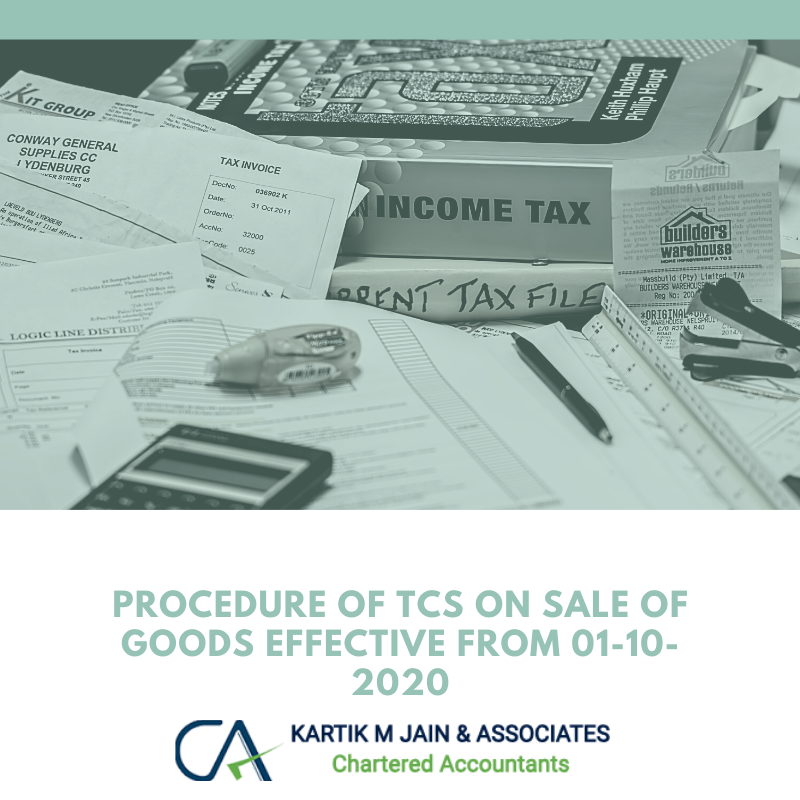Wrong interpretation / understanding / procedure of TCS on Consideration for sale of goods under newly introduced section 206C(1H) effective from 01-Oct- 2020.
Most of the experts / businessmen have adopted following process.
They (Sellers) have modified their billing software to add one more line to add TCS amount in final bill amount (In invoices of qualifying customers (buyers) i.e. those buyers from whom sellers have already received sales consideration (payments for goods sold) more than 50 Lacs since 01-Apr-2020.). Here also many experts / businessmen think that buyer qualifies for TCS when “Sales” since 01-Apr-20 exceeds 50 Lacs. Please note that threshold limit of 50 Lacs is not for “Sales ” but that of “Collection” (Receipt of Sales consideration as per legal language.)
Now most of the experts have advised these businessmen to deposit the sum of such (As charged in bills) TCS amount as TCS collected to government, on due dates. Software will simply generate a report giving bill wise / party wise TCS collected in bills and businessmen will deposit this total amount to government on due date. At the time of filing returns for TCS, party wise /PAN details of TCS will be filled and the same credit will be received by buyers.
In my opinion this is wrong procedure / interpretation of law. You (Seller) are supposed to compute and pay to government TCS on receipt of sales consideration (Collection) and not TCS you have added in bills.
TCS collected in bills and TCS on receipt of sale consideration (collection) are not going to match. (Except in situations where a seller is selling goods by getting immediate payment against sale, like a car dealer.)
For example, in October 20 you receive payments worth Rs. 10 Lakh from a qualifying buyer for goods sold in earlier months, you have to pay Rs.750/- TCS to government, but if you have not sold any goods to this buyer in October 20, your software will show nil TCS amount against this buyer and your tax payment will be short. In short for all the collection received from 1-Oct-20 towards earlier months’ bills, you will end up missing / short paying the TCS. Despite resolving this in some way, still there will be mismatch between TCS which you are supposed to pay (on collection) and TCS you pay (as per bills) for that month. This will continue to occur in subsequent period as well because most businesses do sales on credit basis and hence monthly party wise sales and collection are not likely to match.
Government has prescribed what TCS amount you must pay to them (i.e. On receipt of sale consideration – collection) but not prescribed any method for how to collect this TCS from the buyers. It is left upon seller. Now if a seller wishes to recover the TCS by adding it in bills, that is his choice, but HE MUST DEPOSIT/ PAY TCS TO GOVERNMENT AS PER RECEIPT OF SALE CONSIDERATION (COLLECTION) AND NOT AS PER SALE. Even if the seller is paying TCS as per his collection report, his TCS collected as per bills and TCS payable will differ and he may end up having paid more than what he collected, from his own pocket.
One suggestion is not to collect TCS in bills but at the end of every month seller should compute TCS on collection received during the month (from eligible buyers) and raise debit notes for each buyer. This will result into exact match between TCS collected as per law and TCS paid to government.
DO NOT CONFUSE BETWEEN “SALES” and “RECEIPT OF SALES CONSIDERATION (COLLECTION / PAYMENTS RECEIVED)”.
Consult your professional expert about correctness of above interpretation/ opinion before taking any action based upon it.
This article is based on the inputs provided by Mr. Atul Shah
Kartik M Jain and Associates,Chartered Accountants is a practicing CA in Pune is a professionally managed firm serving domestic and international clients providing services relating to direct and international taxation, indirect taxation, auditing and assurance and Consultancy. It is amongst the best CA firms in Pune. With a team of expert and experienced Professionals, The firm aims to provide quality and effective services. The firm provides complete end to end solutions to your complete business needs under one roof. Our sister Firm, Payal K Jain & Associates, a Company Secretary in Pune provides services in relation to Company Formation in Pune and across India, Corporate Law and Compliance, ROC filings, FEMA, Trademark Registration, etc.
Our Services :- GST consultation, Chartered accountant, Income Tax consultancy, Corporate law, International Taxation, Transfer Pricing, Regulatory & Advisory Services.


